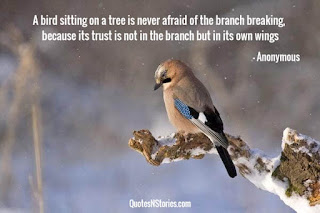Getting a three-star Michelin rating is the equivalent of winning a
gold medal in the Olympics. Gordon Ramsey famously described that having stars
taken away is like "losing a girlfriend." But not everyone wants a
star. Singapore chef, Andre Chiang, the only Chinese chef in World 50 best
list, the owners of the Checkers restaurant in Wales and British chef Marco Pierre
White, who became famous for being the youngest chef to earn all three Michelin
stars in 1994, have all said no to Michelin recently. "I don't need Michelin, and they don't need me. They sell tires, I sell food," White said.
Everything in life requires courage.
The most dominant emotion today is fear. We are afraid. Afraid of losing the things we have worked hard to buy, afraid of rejection and failure, afraid of certain types of people, afraid of criticism, afraid of suffering and heartaches, afraid of change, afraid to tell people how we really feel....we are afraid of so many things.
There are people who try to gain power by instilling fear in others. Sad to say, it's a ploy that predictably works.
How can you make good choices about anything if you're afraid of the results or the possible consequences you're going to face?
Life has taught me that I've never made a good decision based on fear. I regret once staying in a job too long for fear of hurting my friend and boss. Eventually I left the job and lost the friendship.
Those negative inner voices can be relentless. How many times have you thought about doing something only to convince yourself that you couldn't do it?
You know, even today, I have to deal with those voices occasionally. And although they never are silenced completely, I have learned to tune them out.
Everything in life requires courage.
The most dominant emotion today is fear. We are afraid. Afraid of losing the things we have worked hard to buy, afraid of rejection and failure, afraid of certain types of people, afraid of criticism, afraid of suffering and heartaches, afraid of change, afraid to tell people how we really feel....we are afraid of so many things.
There are people who try to gain power by instilling fear in others. Sad to say, it's a ploy that predictably works.
How can you make good choices about anything if you're afraid of the results or the possible consequences you're going to face?
Life has taught me that I've never made a good decision based on fear. I regret once staying in a job too long for fear of hurting my friend and boss. Eventually I left the job and lost the friendship.
Those negative inner voices can be relentless. How many times have you thought about doing something only to convince yourself that you couldn't do it?
You know, even today, I have to deal with those voices occasionally. And although they never are silenced completely, I have learned to tune them out.








